Неделя о слепом
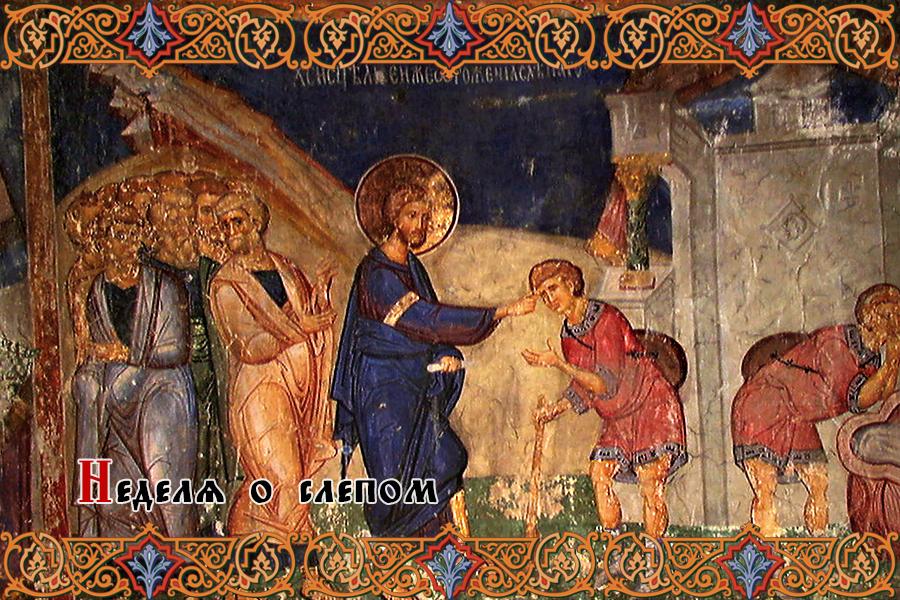
Неделя о слепом — шестое воскресенье по Пасхе.
На Литургии читается Евангелие от Иоанна о чуде исцеления Исусом
Христом слепорожденного человека, глаза которого Спаситель помазал
брением от Своего плюновения, а затем отправил умыться слепого в купели
Силоама, после чего слепой от рождения, ко всеобщему удивлению, стал
зрячим.
Исцеление Исусом Христом слепорожденного. История
Увидев слепого от рождения, который просил милостыню, ученики спросили Господа: «Учитель, кто согрешил, он или родители его, что родился слепым?» Исус же ответил: «Не согрешил ни он, ни родители его, но это для того, чтобы на нем явились дела Божии». Христос, плюнув на землю, сделал брение, помазал этим брением слепому глаза и сказал ему: «Пойди, умойся в купальне Силоам». Этот источник находился у подножия горы Сион. Слепой умылся в нем и прозрел. Это чудо привело всех в изумление. Одни не верили, что это и есть тот самый слепой от рождения, другие говорили, что это он. Стали расспрашивать у слепорожденного, как он прозрел. Он отвечал: «Человек, которого зовут Исусом, сделал брение, помазал мне глаза и велел умыться в купальне Силоамской; я умылся, и вот я вижу». Повели его к фарисеям — а это чудо было совершено в день субботний. На расспросы фарисеев прозревший человек опять отвечал рассказом о чудесном исцелении. Тогда между фарисеями состоялся спор об Исусе. Некоторые говорили: «Этот Человек не от Бога, потому что не хранит субботы; другие же возражали: «Может ли человек грешный творить такие чудеса?» Спросили исцеленного: «А ты что думаешь о Нем?» «Я думаю, что Он пророк», — ответил тот. Но фарисеи все-таки не убедились и столь явным свидетельством силы Божией. Они усомнились, действительно ли тот человек был слеп, и позвали его родителей, спросив у них, точно ли это сын их и почему он, будучи слепым от рождения, прозрел? Родители слепорожденного знали, что фарисеи ненавидели Исуса и уже решили между собой отлучить от синагоги всякого, кто признает Его за Мессию. В малодушии своем они побоялись навлечь на себя гнев фарисеев, воздав должную честь Тому, Кто исцелил их сына, и потому только отвечали: «Знаем, что это сын наш и что он родился слепым. Как же он прозрел и кто исцелил его, этого мы не знаем; он сам взрослый; пусть сам расскажет». Тогда фарисеи сказали слепорожденному: «Благодари Бога; мы знаем, что Тот, Кто исцелил тебя, человек грешный». «Грешник ли Он, не знаю, а знаю только то, что я был слеп, а теперь вижу», — отвечал прозревший. Опять фарисеи стали расспрашивать, как он прозрел. «Я уже рассказывал вам, зачем опять спрашиваете? Разве и вы хотите сделаться Его учениками?». Фарисеи разгневались. «Ты ученик Его, — сказали они, — а мы Моисеевы ученики. Мы знаем, что с Моисеем говорил Бог, а об этом Человеке не знаем, откуда Он». «Удивительно, что вы не знаете, откуда Он, — отвечал человек, — а Он отверз мне очи. Слыхано ли, чтобы кто-нибудь отверз очи слепорожденному? Мы все знаем, что грешников Бог не слушает, но слушает тех, кто чтит Бога и творит волю Его. Если бы этот Человек не был от Бога, то не мог бы сделать такого чуда». Фарисеи еще более рассердились и выгнали вон прозревшего слепца. Господь Исус Христос узнал об этом и, встретив его, спросил: «Веруешь ли ты в Сына Божия?» «Кто Он, Господи, чтобы мне веровать в Него?», — спросил прозревший. «Ты видел Его, и Он говорит с тобою», — сказал Господь. «Верую, Господи!» — воскликнул тогда юноша и поклонился Исусу до земли (Ин. 9:2–38).
Слепой от рождения в результате чуда, совершенного Исусом Христом, обрел зрение не только телесное, но и духовное — он уверовал в то, что Христос — это Сын Божий. А фарисеи, телесно зрячие от рождения, ослепли от своей злобы духовными очами. Они продолжали клеветать на Христа, не веря в величайшее чудо исцеления слепорожденного и негодуя по поводу того, что Исус сотворил чудо в субботу.
Неделя о слепом. Богослужение
Неделя о слепом — последняя перед праздником отдания Пасхи, когда богослужение совершается по особому пасхальному чину. С этого дня на Утрени начинают петь катавасию Вознесению Господню. По Триоди Цветной песнопения Недели о слепом указаны в течение трех дней, до среды отдания Пасхи. Канон и стихеры, посвященные чуду прозрения слепого, говорят об исцелении как телесной, так и душевной слепоты, когда мы молимся Господу и за себя самих, чтобы сподобиться получить истинное духовное прозрение.
Тропарь:
Собез8начaльное сл0вw nц7у и3 д¦ови, є4же t дв7ы р0ждьшеесz на спасeніе нaше. воспоeмъ вёрніи и3 поклони1мсz, ћкw бlгоизв0ли пл0тію взhти на кrтъ, и3 смeрть претерпёти, и3 воскреси1ти ўмeршыz, во слaвное воскrніе своE.
Кондак:
Дш7eвныма nчи1ма wслэплeнъ, къ тебЁ хrтE прихожю2, ћкw же слэпhй t рождeніz, покаsніемъ зовu2 ти, ты2 є3си2 сu1щимъ во тмЁ свётъ пресвётлый.
Исцеление Исусом Христом слепорожденного. Иконы
Иконография исцеления Исусом Христом слепорожденного представляет собой изображение Исуса Христа, Который помазывает брением очи слепого. Немного позади Спасителя стоят его ученики.
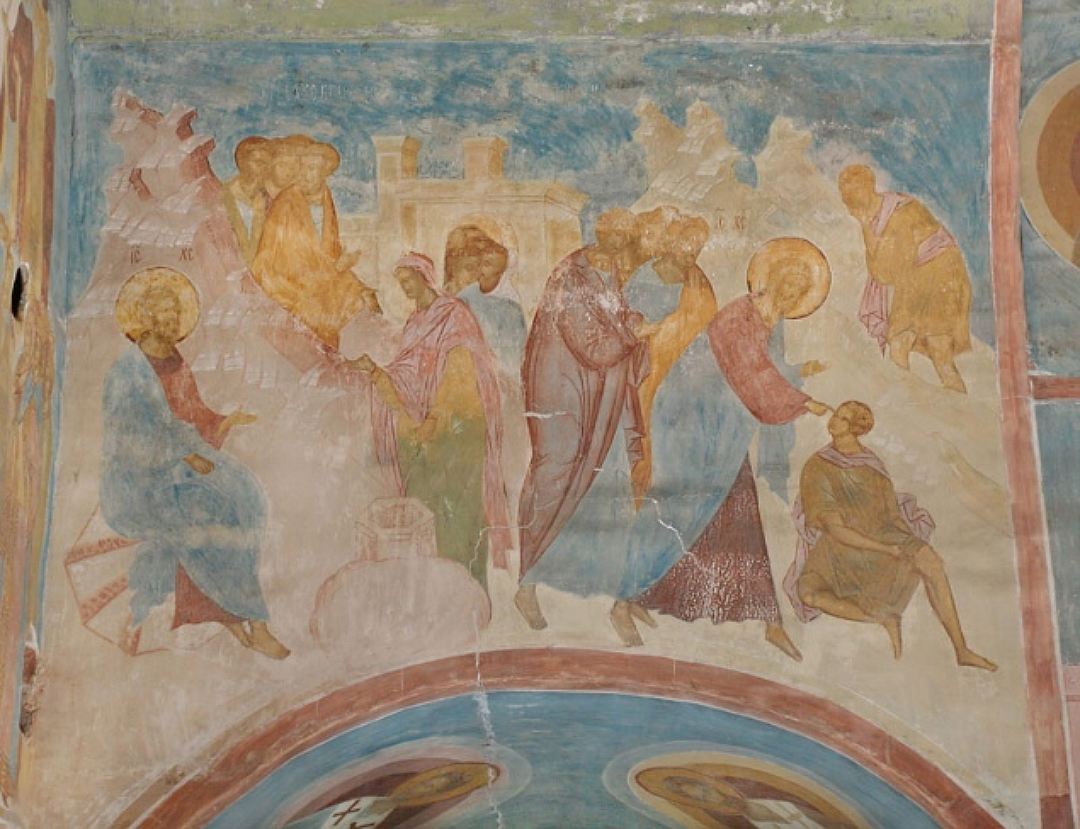
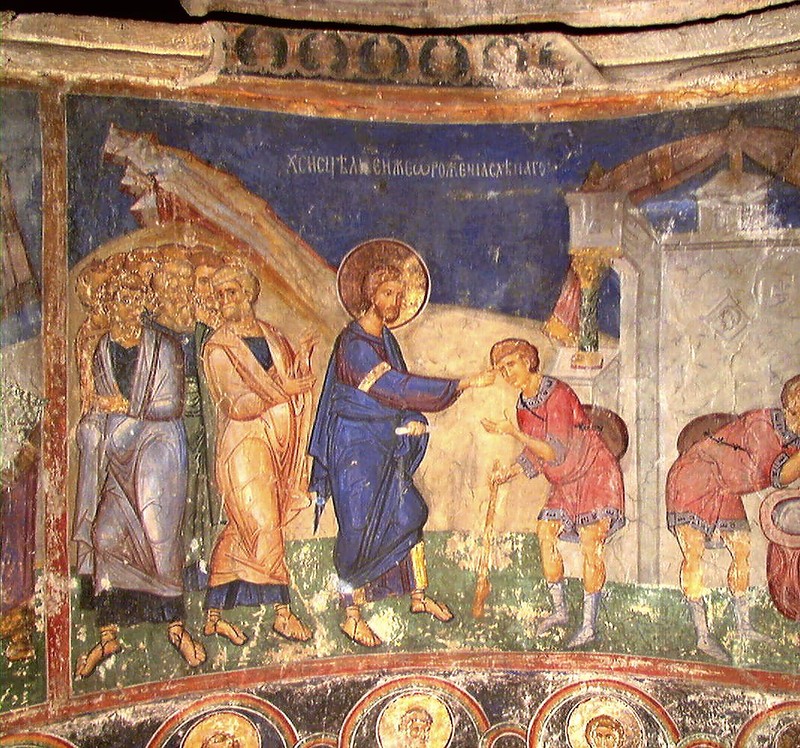
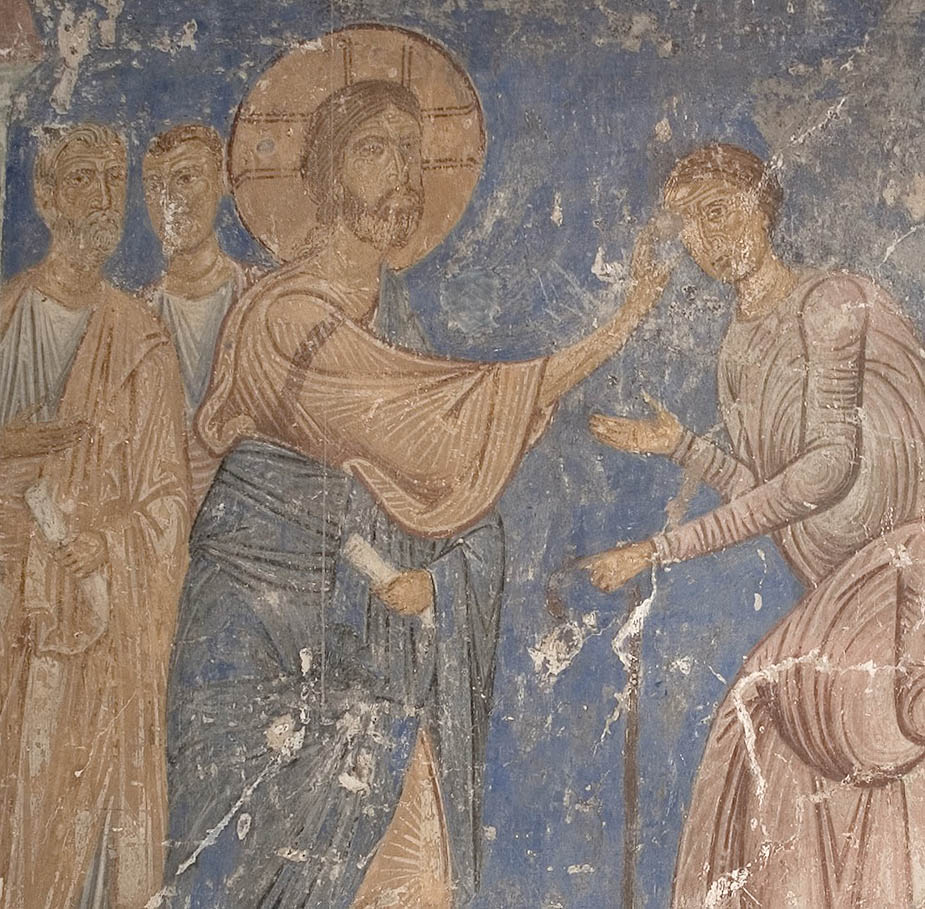
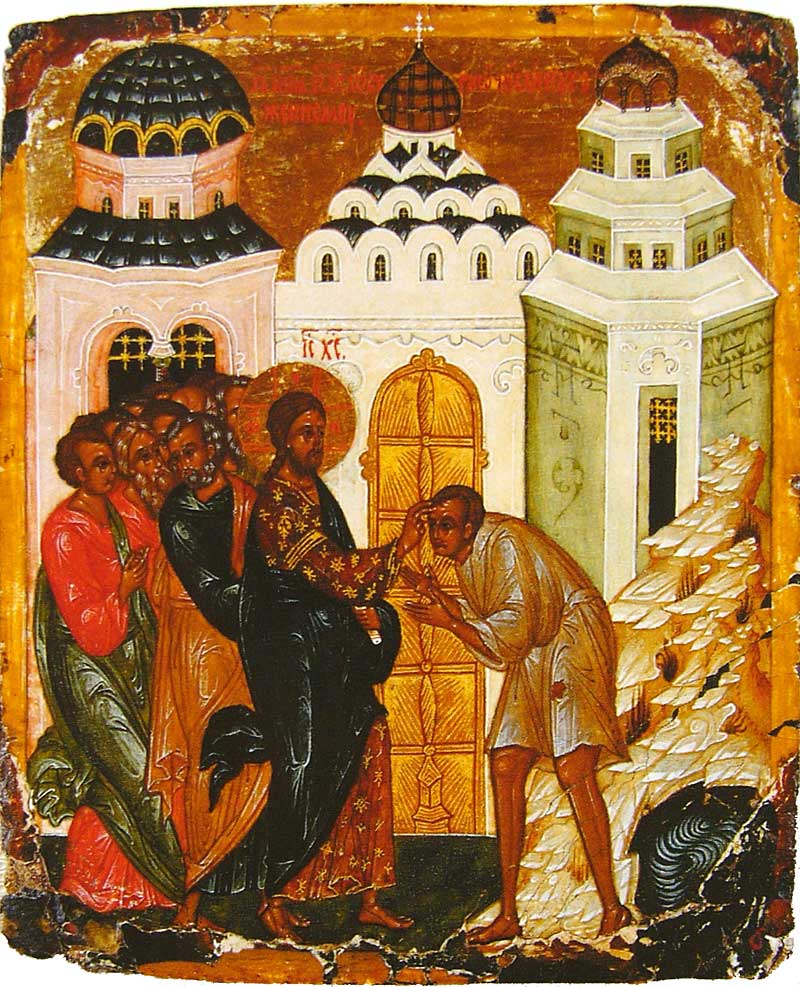
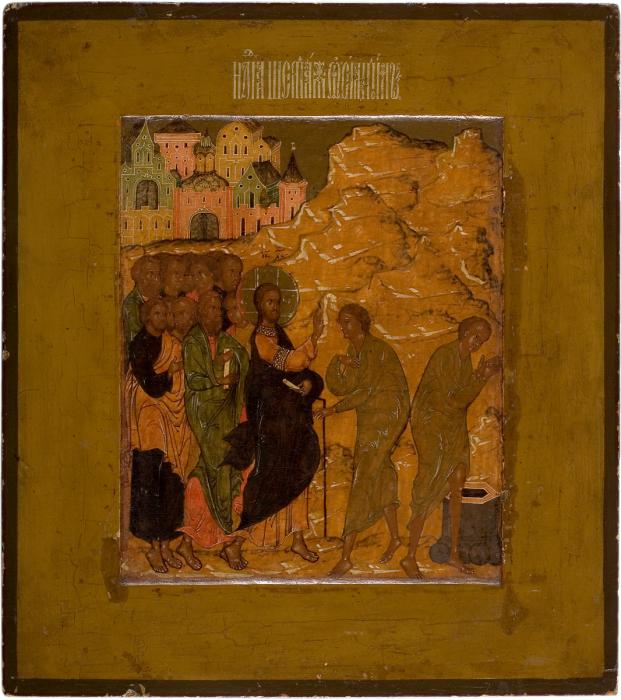
Неделя о слепом. Душеполезное поучение
И$же слэпhи роди1всz, во своeмъ п0мыслэ глаг0лаше, є3дA ѓзъ грёхъ рaди роди1телных роди1хсz без8о3чію2; є3дA ѓзъ заневёріе kзhкъ роди1хсz во њбличeніе; недомышлsюсz вопрошaти, когдA н0щь, когдA дн7ь; нетерпи1тэми н0зе кaменнагw претыкaніz. неви1дэхъ бо сlнца сіsюща, ни о4браза менE создaвшаго. но молю1тисz хrтE б9е, при1зри намS и3 поми1луй мz. (стихера дню, л.424).
Так показывают нам церковные песнопения то жалкое и печальное положение, в котором находился слепорожденный. Справедливо ли было это? Ученики недоумевают о причине и спрашивают Господа, предполагая здесь наказание за грехи. Но Господь говорит, что нет, но на человеке должны теперь явиться дела Божии. Вопросы и недоумения, которые могли бы возникнуть при чтении этих Евангельских строк, подробно разъясняет нам бл. Феофилакт Болгарский:
Иной спросит: как Он сказал это? Ибо это значило бы, что человек, лишенный света, был обижен для того, чтобы на нем явились дела Божии? Разве они не могли явиться иначе?
Какую же, скажи ты, человек, он терпит обиду? Ту, скажешь, что света лишен. И какой вред от того, что лишен чувственного света? Напротив, он более облагодетельствован. Ибо вместе со зрением телесным он прозрел и очами душевными. Слепота послужила ему на добро, так как чрез исцеление от нея он познал истинное Солнце Правды. Итак, слепец этот не обижен, а облагодетельствован [1].
Для чего же Господь сотворил новое чудо именно таким образом: и словом, и делом, и повелением к слепорожденному пойти к Силоамскому источнику, когда при других случаях не только исцелял, но и мертвых воскрешал одним лишь только словом Своим? Но здесь, после недавнего исповедания пред иудеями о вечном бытии Своем: «Прежде нежели был Авраам, Я есмь» (Ин. 8, 58), — пожелал показать на деле, чувственным образом, что и Сам Он — Творец и Создатель всего живого, Единосущный Отцу Своему:
Исус не остановился на словах, но присоединил к ним и дело. Он плюнул на землю, сделал брение из плюновения и брением помазал глаза слепому, показывая чрез брение, что и Адама тело образовал из брения Он же. Одни слова, что создал Адама Я, могли показаться соблазнительными для слушателей, но когда слова подтверждаются делом, не оставалось уже повода к соблазну. Устрояет глаза из брения, употребляя тот же способ творчества, каким сотворил и Адама. Не только устроил глаза и открыл их, но одарил зрением, а это показывало, что Он вдохнул и душу в Адама. Ибо без действия души глаз никогда бы не увидел, хотя бы и был устроен.
Употребил и плюновение для одарения зрением. Так как Он намерен был послать слепца на Силоам, то, чтобы не приписали чуда воде источника, но познали, что образовала глаза слепому и открыла их сила, вышедшая из уст Его, для сего плюнул на землю и из плюновения уст сделал зрение. Потом, чтоб ты не подумал, что чудо зависело от земли, повелевает умыться, чтобы брение совсем отстало. Впрочем, некоторые говорят, это брение совсем не отпало, но превратилось в глаза. Повелевает слепцу пойти на Силоам, частью для того, чтобы обнаружилась степень веры его и послушания, ибо он не рассуждал, что не нужно идти на Силоам или умываться, если брение и плюновение делают его вполне зрячим, но повиновался Повелевшему; частью для того, чтобы заградить уста неразумных иудеев, ибо естественно, многие смотрели на него, когда он шел с глазами, помазанными брением, и внимательно вглядывались в него, так что не могли впоследствии говорить: это он, это не он.
Для чего евангелист прибавил объяснение имени Силоам? Для того, чтобы ты знал, что и тут исцелил слепца Христос и что Силоам — Образ Христа. Ибо как Христос есть Камень духовный (1 Кор. 10, 4), так и Силоам духовнвый; и как ручей Силоамский своим странным течением представлял нечто внезапное и поразительное, так и пришествие Господа, сокровенное и недоведомое ангелам, силою своею потопляет всякий грех [2].
Бл. Феофилакт Болгарский много восхваляет мужество прозревшего слепого, которого дважды призывали на сонм фарисеев. Не для того, чтобы точно уразуметь о совершенном чуде: ибо не бывало еще такого случая во всей истории человечества, чтобы кто-нибудь мог исцелить слепорожденного, но, напротив, желая найти больше поводов к обвинению Исуса, сотворившего в день субботний брение из земли. Исцеленный же, будучи человеком очень незнатного и бедного рода, на допросе пред именитыми начальниками и старейшинами не только не устрашился коварных их вопросов, чтобы отречься от истины, но не побоялся и сам укорять их и спорить с ними, за что и претерпел суровое наказание:
Как сыны лжи, (они) выгоняют его, исповедника истины, вон из храма. Но это послужило ему во благо. Из храма его выгнали, а Господь храма тот час нашел его. Обесчестили его за мнение в пользу Христа, а он удостоился познать Сына Божия [3].
Чудо об исцелении слепорожденного можно толковать и иносказательным образом:
Примечай, пожалуй, что чудо это совершилось и в духовном смысле. Слеп был и вообще всякий человек от рождения, то есть от подчинения рождению, с которым соединено тление, ибо с тех пор, как мы осуждены на смерть и размножение чрез страстное рождение, оттоле над нашими мысленными глазами распростерлось как бы некое густое облако, и, может быть, та кожаная одежда, о которой упоминает Св. Писание (Быт. 3, 21).
Слеп был в частности народ языческий. И он был слеп от рождения. Например, еллины от того, что обоготворили рождаемое и тленное, стали слепы, по сказанному: «Омрачилось несмысленное их сердце» (Рим. 1, 21).
Сего слепца, то есть вообще всякого человека, или в частности язычников, Исус «увидел». Как слепец не мог увидеть Творца, то Он по благоутробию милости Сам посетил нас, Восток свыше (Лк. 1, 78). Как же увидел? «Проходя», то есть, не на небе будучи, и, по словам пророка, «преклонившись с неба и призрев на всех сынов человеческих» (Пс. 13, 2; 2, 3), но явившись на земле. И в ином смысле: «проходя» увидел язычников, то есть, пришед не к ним преимущественно. Ибо Он пришел к погибшим овцам дома Израилева (Мф. 15, 24), а потом, как бы мимоходом, взглянул и на язычников, сидящих во тьме совершенного незнания.
Как врачует слепоту? Плюнув на землю и сделав брение. Ибо кто поверит, что Слово низошло на Святую Деву, как капля, каплющая на землю, тот помажет себе мысленные глаза брением из плюновения и земли, то есть Единым Христом, состоящим из Божества, которого знаком (символом) служит капля и плюновение, и Человечества, знаком которого служит земля, из которой тело Господа.
Остановится ли врачевание на вере? Нет; должно идти на Силоам, источник крещения, и креститься в Посланного, то есть во Христа. Ибо все мы, которые духовно крестились, во Христа крестились. А кто крестится, тот после сего подвергается искушениям. Может быть, за исцелившего его Христа поведут пред царей и правителей (Лк. 21, 12). Посему нужно быть твердым и непреклонно стоять во исповедании, не отрекаться из страха, но, если понадобится, стать и отлученным, и изгнанным из синагоги, по сказанному: будете ненавидимы всеми за имя Мое, и изгонят вас из синагог (Мф. 24, 9; Ин. 16, 2). Если люди, враждующие против истины, и выгонят исповедника ея, и удалят от святого и драгоценного для них, то есть от богатства и славы, то найдет его Исус, и, когда врагами будет обесчещен, тогда от Христа будет особенно почтен познанием и основательнейшею верою. Ибо тогда наиболее будет поклоняться Христу, как Человеку видимому и как Истинному Сыну Божию [4].
Источники:
[1] Бл. Феофилакт Болгарский. Толкование на Евангелие от Иоанна.
[2] Там же.
[3] Там же.
[4] Там же.








